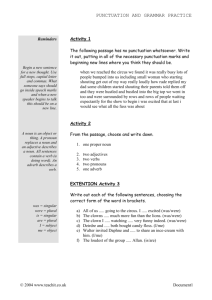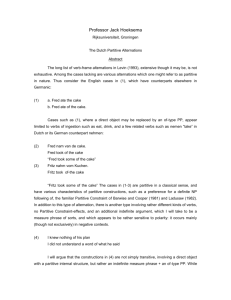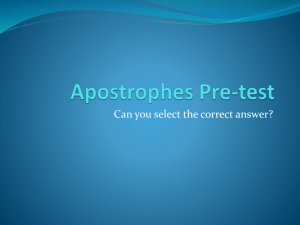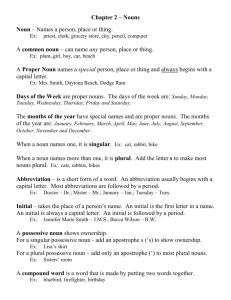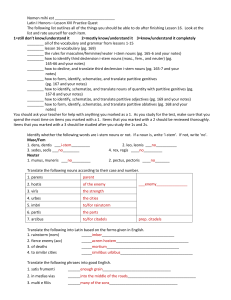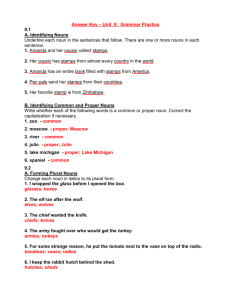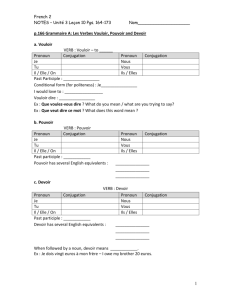French Partitive Articles - Les classes de francais de Mme Gandhi
advertisement
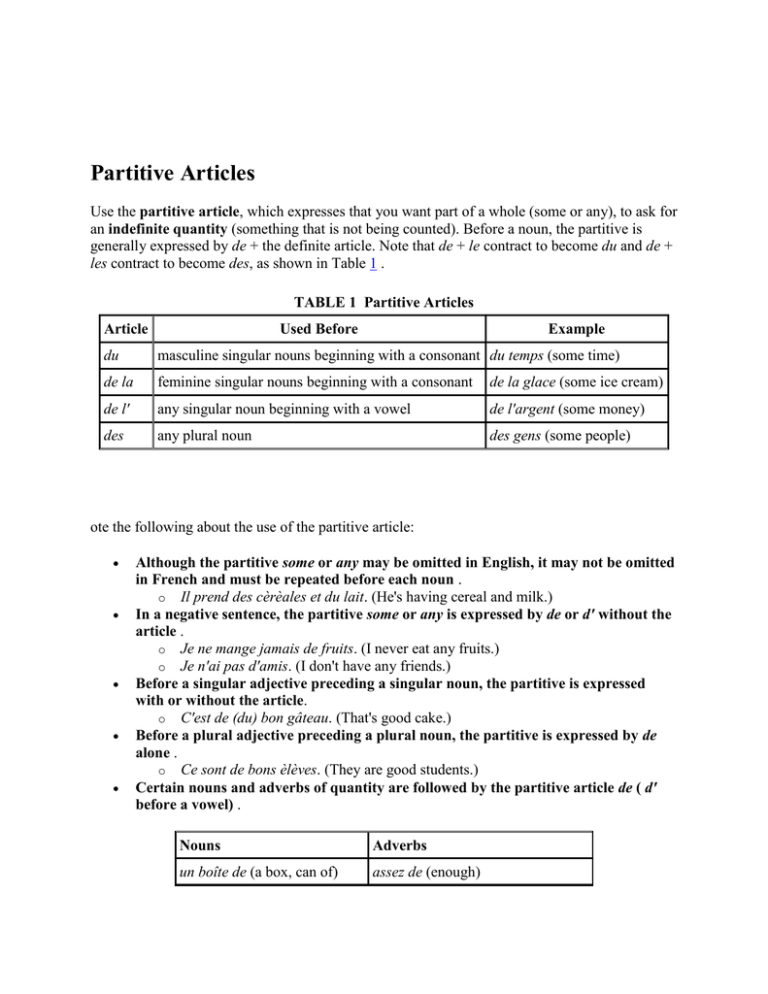
Partitive Articles Use the partitive article, which expresses that you want part of a whole (some or any), to ask for an indefinite quantity (something that is not being counted). Before a noun, the partitive is generally expressed by de + the definite article. Note that de + le contract to become du and de + les contract to become des, as shown in Table 1 . TABLE 1 Partitive Articles Article Used Before Example du masculine singular nouns beginning with a consonant du temps (some time) de la feminine singular nouns beginning with a consonant de la glace (some ice cream) de l' any singular noun beginning with a vowel de l'argent (some money) des any plural noun des gens (some people) ote the following about the use of the partitive article: Although the partitive some or any may be omitted in English, it may not be omitted in French and must be repeated before each noun . o Il prend des cèrèales et du lait. (He's having cereal and milk.) In a negative sentence, the partitive some or any is expressed by de or d' without the article . o Je ne mange jamais de fruits. (I never eat any fruits.) o Je n'ai pas d'amis. (I don't have any friends.) Before a singular adjective preceding a singular noun, the partitive is expressed with or without the article. o C'est de (du) bon gâteau. (That's good cake.) Before a plural adjective preceding a plural noun, the partitive is expressed by de alone . o Ce sont de bons èlèves. (They are good students.) Certain nouns and adverbs of quantity are followed by the partitive article de ( d' before a vowel) . Nouns Adverbs un boîte de (a box, can of) assez de (enough) un bol de (a bowl of) beaucoup de (many, much, a lot of) une tasse de (a cup of) peu de (few, a little) un verre de (a glass of) trop de (too many, much) Donnez-moi une tasse de cafè. Give me a cup of coffee.) Il a beaucoup d'amis. (He has a lot of friends.) The following nouns and adverbs of quantity are followed by de + definite article: o la plupart (most) o bien (a good many) o la majoritè (the majority) o la plus grande partie (the majority) o La plupart des gens aiment ce film. (Most people like this movie.) The adjectives plusieurs (several) and quelques (some) modify the noun directly . o J'adore plusieurs lègumes. (I like several vegetables.) o Il achète quelques livres. (He is buying some books.) The partitive is not used with sans (without) and ne … ni … ni (neither … nor) . http://www.youtube.com/watch?v=KzmjeibKX_I French Partitive Articles Articles partitifs The partitive articles in French correspond to "some" or "any" in English. There are four forms of the French partitive article: 1. 2. 3. 4. du de la de l' des masculine singular feminine singular m or f in front of a vowel or h muet m or f plural The form of the partitive article to use depends on three things: the noun's number, gender, and first letter: If the noun is plural, use des If it's singular starting with a vowel or h muet, use de l' If it's a singular noun and starts with a consonant or h aspiré, use du for a masculine noun and de la for a feminine noun Meaning and usage of the French partitive article The partitive article indicates an unknown quantity of something, usually food or drink. It is often omitted in English. Avez-vous bu du thé ? Did you drink some tea? J'ai mangé de la salade hier. I ate salad yesterday. Nous allons prendre de la glace. We're going to have some ice cream. After adverbs of quantity, use de instead of the partitive article. Il y a beaucoup de thé. There is a lot of tea. J'ai moins de glace que Thierry. I have less ice cream than Thierry. In a negative construction, the partitive article changes to de, meaning "(not) any": J'ai mangé de la soupe. > Je n'ai pas mangé de soupe. I ate some soup. > I didn't eat any soup. Partitive Articles The partitive articles are du (masculine singular), de la (feminine singular), and des (masculine, feminine plural). The partitive article agrees in number and (for the singular forms) in gender with the nouns they modify (see Noun): du vin de la glace des épinards The partitive is used to refer to objects, people, and events which have not been clearly defined by the speaker or the context. The nouns which they modify are generally not countable nouns (unlike those modified by the indefinite article): Est-ce que tu as de la patience? Do you have patience? Instead, the partitive usually indicates an undetermined quantity. It is frequently used after verbs expressing possession or consumption. Nous allons acheter du lait. We're going to buy some milk. After expressions of quantity, the partitive is usually reduced to de: Les étudiants achètent beaucoup de pâtisseries. Students buy a lot of pastries. Aujourd'hui, les gens ont plus d'activités qu'avant. Today people have more activities than before. However, if the quantified noun is modified by an adjective or by a relative clause, then the partitive remains: Elle a pris une tasse du café que j'ai préparé. She took a cup of the coffee I prepared. If a sentence is negative, the partitive article changes to de: Nous n'avons plus de patience. We no longer have (any) patience. except if there is a contrast: Je ne prendrai pas de la tarte, mais des biscuits, s'il vous plaît. I won't have any pie, but (I'll take) some cookies, please. Elegant French reduces des to de when it precedes a plural adjective preceding a noun: Ils ont fait de beaux dessins. They did some beautiful drawings.


